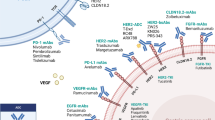Abstract
This study aims to explore the detailed signal transduction mechanism of epidermal growth factor receptor (EGFR)/signal transducers and activators of transcription 3 (STAT3) that contributes to the progression of gastric cancer (GC). The STAT3 expression, phosphorylated STAT3 (pSTAT3) expression, and EGFR expression were evaluated by using molecular detection methods of GC tissues, adjacent non-tumor tissues, GC cell lines, and normal gastric cell line. Cetuximab was administered in each cell line to demonstrate the correlations among the above biomarkers. Survival and relationship analyses were adopted to demonstrate the important mechanism of EGFR/STAT3 signaling pathway contributing to the progression of GC. STAT3 expression, pSTAT3 expression, and EGFR expression in GC tissues were significantly higher than those in adjacent non-tumor tissues, respectively. Similarly, we found that STAT3 expression, pSTAT3 expression, and EGFR expression were much higher in GC cell lines than those in GES-1 cell line. With cetuximab administration, both STAT3 expression and pSTAT3 expression in all GC cell lines decreased simultaneously. With Cox proportional hazards model analysis, pSTAT3 expression was identified as the independent predictors of the overall survival of GC patients, as was EGFR expression. Furthermore, we found that there were significant associations between STAT3 expression, pSTAT3 expression, EGFR expression, and lymph node metastasis in GC tissues. The activation of EGFR/STAT3 signaling pathway may contribute to lymph node metastasis, which can promote the progression of GC.




Similar content being viewed by others
References
Buettner R, Mora LB, Jove R. Activated STAT signaling in human tumors provides novel molecular targets for therapeutic intervention. Clin Cancer Res. 2002;8:945–54.
Alvarez JV, Febbo PG, Ramaswamy S, Loda M, Richardson A, Frank DA. Identification of a genetic signature of activated signal transducer and activator of transcription 3 in human tumors. Cancer Res. 2005;65:5054–62.
Deng JY, Sun D, Liu XY, Pan Y, Liang H. STAT-3 correlates with lymph node metastasis and cell survival in gastric cancer. World J Gastroentrol. 2010;16:5380–7.
Lee JY, Kang WK, Park JO, Park SH, Park YS, Lim HY, et al. Expression of activated signal transducer and activator of transcription 3 predicts poor clinical outcome in gastric adenocarcinoma. APMIS. 2009;117:598–606.
Yu H, Kortylewski M, Pardoll D. Crosstalk between cancer and immune cells: role of STAT3 in the tumour microenvironment. Nat Rev Immunol. 2007;7:41–51.
Alvarez JV, Greulich H, Sellers WR, Meyerson M, Frank DA. Signal transducer and activator of transcription 3 is required for the oncogenic effects of non-small-cell lung cancer-associated mutations of the epidermal growth factor receptor. Cancer Res. 2006;66:3162–8.
Kanda N, Seno H, Konda Y, Marusawa H, Kanai M, Nakajima T, et al. STAT3 is constitutively activated and supports cell survival in association with survivin expression in gastric cancer cells. Oncogene. 2004;23:4921–9.
Kluge A, Dabir S, Kern J, Nethery D, Halmos B, Ma P, et al. Cooperative interaction between protein inhibitor of activated STAT3 with EGFR blockade in lung cancer. Int J Cancer. 2009;125:1728–34.
Jaehne J, Meyer HJ, Maschek H, Geerlings H, Bruns E, Pichlmayr R. Lymphadenectomy in gastric adenocarcinoma: a prospective and prognostic study. Arch Surg. 1992;127:290–4.
Dolled-Filhart M, Camp RL, Kowalski DP, Smith BL, Rimm DL. Tissue microarray analysis of signal transducers and activators of transcription 3 (Stat 3) and phospho-Stat3 (Tyr705) in node-negative breast cancer shows nuclear localization is associated with a better prognosis. Clin Cancer Res. 2003;9:594–600.
Zheng Z, Bepler G, Cantor A, Haura EB. Small tumor size and limited smoking history predicts activated epidermal growth factor receptor in early-stage non-small cell lung cancer. Chest. 2005;128:308–16.
Chen J, Wang J, Lin L, He L, Wu Y, Zhang L, et al. Inhibition of STAT3 signaling pathway by nitidine chloride suppressed the angiogenesis and growth of human gastric cancer. Mol Cancer Ther. 2012;11:277–87.
Kim DY, Cha ST, Ahn DH, Kang HY, Kwon CI, Ko KH, et al. STAT3 expression in gastric cancer indicates a poor prognosis. J Gastroenterol Hepatol. 2009;24:646–51.
Fukuda K, Saikawa Y, Takahashi M, Takahashi T, Wada N, Kawakubo H, et al. Antitumor effect of cetuximab in combination with S-1 in EGFR-amplified gastric cancer cells. Int J Oncol. 2012;40:975–82.
Sen M, Joyce S, Panahandeh M, Li C, Thomas SM, Maxwell J, et al. Targeting Stat3 abrogates EGFR inhibitor resistance in cancer. Clin Cancer Res. 2012;18:4986–96.
McLoughlin RM, Jenkins BJ, Grail D, Williams AS, Fielding CA, Parker CR, et al. IL-6 trans-signaling via STAT3 directs T-cell infiltration in acute inflammation. Proc Natl Acad Sci USA. 2005;102:9589–94.
Yin Z, Zhang Y, Li Y, Lv T, Liu J, Wang X. Prognostic significance of STAT3 expression and its correlation with chemoresistance of non-small cell lung cancer cells. Acta Histochem. 2012;114:151–8.
Zhao X, Sun X, Li XL. Expression and clinical significance of STAT3, P-STAT3, and VEGF-C in small cell lung cancer. Asian Pac J Cancer Prev. 2012;13:2873–7.
Cai QW, Li J, Li XQ, Wang JQ, Huang Y. Expression of STAT3, MMP-1 and TIMP-1 in gastric cancer and correlation with pathological features. Mol Med Rep. 2012;5:1438–42.
Deng JY, Liang H, Sun D, Zhan HJ, Wang XN. The most appropriate category of metastatic lymph nodes to evaluate the overall survival of gastric cancer following curative resection. J Surg Oncol. 2008;98:343–8.
Acknowledgments
This study was supported by a grant (2010CB529301) from the National Basic Research Program of China (973 Program).
Conflicts of interest
The authors made no disclosures.
Author information
Authors and Affiliations
Corresponding authors
Rights and permissions
About this article
Cite this article
Deng, J., Liang, H., Zhang, R. et al. STAT3 is associated with lymph node metastasis in gastric cancer. Tumor Biol. 34, 2791–2800 (2013). https://doi.org/10.1007/s13277-013-0837-5
Received:
Accepted:
Published:
Issue Date:
DOI: https://doi.org/10.1007/s13277-013-0837-5




